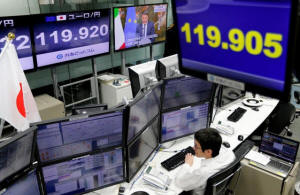|
Italy firms as investors bet against
immediate snap election
 Send a link to a friend
Send a link to a friend
 [December 05, 2016]
By Jamie McGeever [December 05, 2016]
By Jamie McGeever
LONDON (Reuters) - Italian shares rose on
Monday as investors bet against an immediate snap election in Italy
following Prime Minister Matteo Renzi's resignation after defeat in a
constitutional reform referendum.
Markets had been jolted by the scale of Renzi's defeat which pointed to
further turbulence and political crisis in the euro zone's heavily
indebted third-largest economy and particular uncertainty was focused on
the country's fragile banks.
The euro fell as low as $1.0508 <EUR=> and the Milan bourse shed as much
as 2 percent <.FTMIB> at the opening, while Italian bond yields spiked
sharply higher.
But most of these moves quickly reversed. The euro roared back above
$1.06, still down on the day, Italian stocks moved higher, and Germany's
DAX <.GDAXI> and Europe's FTSEuroFirst index of leading 300 shares
<.FTEU3> both rose 1.5 percent.
U.S. futures pointed to a rise of about 0.5 percent at the open on Wall
Street <ESc1>.
"Our base scenario is a caretaker government which could be in place
before Christmas, and no new elections before 2018," Indosuez Wealth
Management chief economist Marie Owens Thomsen said.
"If indeed things pan out according to our base scenario, there would be
little reason for any broad-based turmoil. It is still utterly unlikely
that Italy would leave the EU or the euro," she said.

The referendum outcome was anticipated but the margin of Renzi's defeat
- 59 percent to 41 percent - caused the initial alarm. Analysts say it
could still deal a body blow to a bloc already reeling under
anti-establishment anger that led to Britain's shock exit in June.
Italian financials rose 0.5 percent having fallen more than 4 percent
<.FTIT8300>, and shares in the world's oldest bank, Monte dei Paschi
<.BMPS.MI>, were flat on the day after being suspended at the opening.
Bonds remained under pressure though. Italy's benchmark 10-year bond
yield jumped 11 basis points (bps) to 2.01 percent, widening the premium
investors demand for holding Italian bonds over safer German bonds to
175 bps, before easing slightly.
The strong link between Italy's banking sector and bond market is a
major concern for investors. Banks have been hit by concerns over their
huge exposure to bad loans built up during years of economic downturn.
They also hold large amounts of Italian government debt.
"Bond market turbulence could have serious implications for the
financial system. Foreign investors may be less willing to underwrite
capital raisings of Italian lenders," JP Morgan Asset Management global
market strategist Maria Paola Toschi said.
BREXIT IN THE DOCK
Markets had earlier taken some encouragement when Austria's far-right
presidential candidate was soundly defeated by a pro-European contender,
confounding forecasts of a tight election.
The European Central Bank meets Thursday amid much speculation it will
announce a six-month extension of its asset buying program and widen the
type of bonds it can purchase.
Earlier in Asia, MSCI's broadest index of Asia-Pacific shares outside
Japan <.MIAPJ0000PUS> eased 0.4 percent and Japan's Nikkei <.N225>
closed down 0.8 percent.
[to top of second column] |

An employee of a foreign exchange trading company works near
monitors showing Italian Prime Minister Matteo Renzi on TV news (top
C), and the Japanese yen's exchange rate against the euro in Tokyo,
Japan, December 5, 2016. REUTERS/Toru Hanai

China's CSI 300 <.CSI300> index tumbled 1.7 percent. Hong Kong's Hang
Seng index <.HSI> retreated 0.7 percent.
Wall Street ended Friday on a cautious note, with the Dow <.DJI> off
0.11 percent, while the S&P 500 <.SPX> rose 0.04 percent and the Nasdaq
<.IXIC> gained 0.09 percent.
While the U.S. November payroll report on Friday was firm enough to
cement expectations of a U.S. interest rate hike by the Federal Reserve
this month, a surprise pullback in wages helped bonds pare a little of
their recent losses.
In currencies, the dollar was supported by expectations of a U.S. rate
increase this month and more to come next year. The dollar index,
<.DXY>, which tracks the greenback against a basket of six global peers,
was up 0.2 percent at 100.95.
Against the yen, the dollar rose 0.4 percent to 114 yen <JPY=>.
The New Zealand dollar NZD=, which earlier weakened almost 1 percent to
$0.707 after Prime Minister John Key unexpectedly announced his
resignation on Monday, recovered a little to trade down 0.5 percent at
$0.7090.
New Zealand stocks ended the day 0.7 percent lower.
Sterling could be vulnerable to developments in Britain's Supreme Court
on Monday, as judges hear the government's appeal against a ruling that
parliament must have a vote on Brexit before the process can formally
begin.
The pound was last down 0.1 percent at $1.2710 <GBP=>, having risen to a
multi-month high on Thursday on indications from a leading government
minister that a "soft Brexit" might be the outcome rather than a "hard
Brexit".

"If the government loses its appeal, we could see another leg higher in
sterling against the dollar," City Index research director Kathleen
Brooks said.
In commodity markets, Brent crude <LCOc1> rose 0.5 percent to $54.94 a
barrel, the highest since mid-2015.
(Additional reporting by Alistair Smout; Editing by Louise Ireland)
[© 2016 Thomson Reuters. All rights
reserved.]
Copyright 2016 Reuters. All rights reserved. This material may not be published,
broadcast, rewritten or redistributed. |